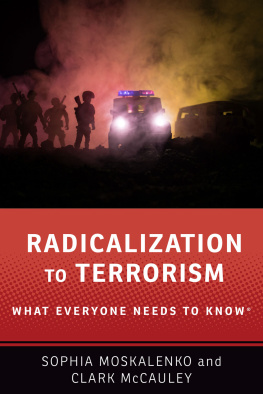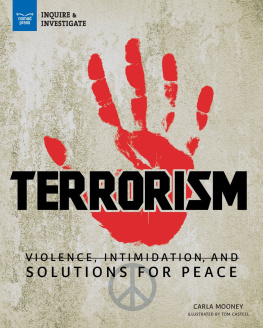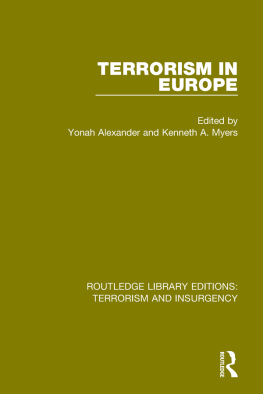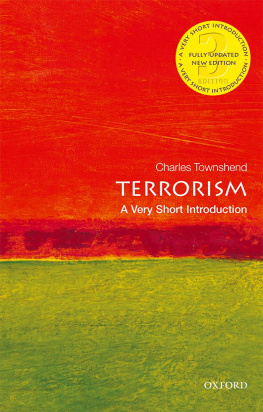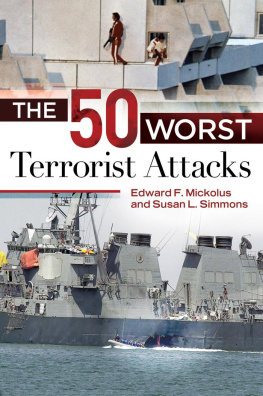First Sentient Publications edition, 2006
Copyright 2006 by Joseph T. McCann
All rights reserved. This book, or parts thereof, may not be reproduced in any form without permission, except in the case of brief quotations embodied in critical articles and reviews.
Cover design by Kim Johansen, Black Dog Design
Book design by Timm Bryson and Nicholas Cummings
Cover photoWall Street bombing, 1920
Library of Congress Cataloging-in-Publication Data
McCann, Joseph T.
Terrorism on American soil : a concise history of plots and perpetrators from the famous to the forgotten / Joseph T. McCann.
p. cm.
Includes bibliographical references.
ISBN 978-1-5918-1143-0
1. Terrorism--United States--History. I. Title.
HV6432.M388 2006
363.3250973--dc22
2006025471
10 9 8 7 6 5 4 3 2
SENTIENT PUBLICATIONS
A Limited Liability Company
1113 Spruce St.
Boulder, CO 80302
www.sentientpublications.com
INTRODUCTION
THE CATASTROPHIC ATTACKS OF SEPTEMBER 11, 2001 HAVE USHERED IN NOT only a new era of public awareness about the threat of terrorism, but also an increase in curiosity about what motivates terrorists and the ways in which they can be prevented from carrying out their horrific attacks. Many new terms and catchphrases have found their way into discussions about terrorism. Terms like war on terror, axis of evil, and suicide bomber are cited widely, but controversy rages on about what these terms mean and whether they accurately portray the true nature of terrorism. A common theme has emerged in discussions on how terrorism can be battled effectivelywhich is that terrorists and those they target are often engaged in a battle of ideas. Today, this battle is most clearly illustrated in the public statements that have gone back and forth between members of al-Qaeda and leaders in the Westparticularly the United States and Great Britain.
A statement issued by Osama bin Laden in November 2002 is quite telling in demonstrating how the radical thinking of al-Qaeda and its sympathizers differs from the views of Westerners, particularly with respect to the legitimacy of political violence. The statement by bin Laden, which was broadcast on Al Jazeera television, provided justification for not only the September 11, 2001 attacks in New York and Washington, but also post-9/11 attacks in Bali, Yemen, and Kuwait against Australian, British, German, and French targets. As with all terrorist attacks carried out by al-Qaeda, bin Laden made clear that they were motivated by zealous sons of Islam who were defending their religion in accordance with what bin Laden and his followers believe to be ordered by God and his prophecies.
A close reading of bin Ladens message reveals an important feature of his thinking and motivation. In referring to U.S. President George Bush as the pharaoh of his age who is part of a criminal gang, bin Laden By calling Cheney and Powell worse than Hulegu, bin Laden was engaging in a form of name-calling that would likely befuddle a large number of American citizens, who were no doubt the target audience the al-Qaeda leader was hoping to reach with his message.
However, the reference to Hulegu of the Mongols is more than an obscure comparison that makes for colorful hyperbole. The reference provides an important insight into the thinking and motivation of the terrorist leader.
The individual referenced in bin Ladens message is Hulegu Kahn, grandson of the infamous conqueror Genghis Khan who ruled over a vast empire in the Far East. Three of Genghis Khans grandsons took over their grandfathers empire, with one ruling in China, another ruling in Mongolia, and Hulegu overseeing the empire in Persia in what is currently Iran. In the thirteenth century, Hulegu Khan sought to expand his grandfathers empire by conquering the Islamic domain and began with the caliphate in Baghdad. To bin Laden, the destruction wrought by Hulegu Khan in the Islamic world is an example of rulers in the non-Islamic world attacking Islam.
What makes bin Ladens comparison of Cheney and Powell to Hulegu Khan so intriguing is that it illustrates the significance that events from centuries ago hold in the minds of al-Qaeda and like-minded terrorists. Moreover, it underscores the importance that historical events have in the thinking and planning of terrorist activities. Indeed, one terrorism researcher has said that to study the history of terrorism should not be anything less than a requirement for understanding terrorism.
Historical references are found throughout most of the public statements issued by bin Laden and his second-in-command, Ayman al-Zawahiri, on behalf of al-Qaeda. These references stand in stark contrast to many of the themes found in public statements made in the American media and by U.S. government officials. For example, when discussing whether we are having success in the war on terror, officials often point out that we are indeed winning because there has not been an al-Qaeda-sponsored attack on American soil since 9/11 and many plots and attacks have been prevented. A careful review of the themes that run through public statements in the war on terror reveals an important difference between terrorist organizations and the people and governments they attack. That is, terrorists tend to think of the current conflict in terms of decades or centuries, whereas citizens in stable Western societies who are the victims of terrorism often think of the conflict in terms of months or years.
The United States is a relatively young nation compared to others in the world that have much longer heritage. In many places where terrorism has long been a concernsuch as Ireland, the Middle East, Turkey, and various regions of Europemany conflicts can be understood only against the background of historical events that led up to the present day conflict. The United States turned 225 years old right before the attacks of September 11, 2001, yet the history of terrorism in America provides an important context for understanding todays threats.
Within a span of only six years, the United States experienced the two deadliest terrorist attacks in its history. On April 19, 1995, a truck bomb detonated by Timothy McVeigh outside the federal building in Oklahoma City, Oklahoma, resulted in 168 fatalities, and the attacks of September 11, 2001 resulted in over 3,000 deaths. The fear and outrage following these acts, as well as the demand for punishment of those responsible, were certainly understandable. However, a popular but mistaken sentiment that emerged in the wake of Oklahoma City and 9/11 was that Americans were somehow no longer safe from terrorism in their homeland. Yet throughout its history the United States has experienced several terrorist attacks. Some are fresh in the minds of many, while others remain relatively unknown or have fallen into obscurity. Because of this mistaken perception that terrorism is a relatively new phenomenon in America, I have decided to examine acts of terrorism that have occurred on the domestic mainland of the United States, rather than attacks that have taken place against U.S. targets overseas, even though attacks on foreign soil can assist us in our understanding of the changing nature of terrorist threats.


